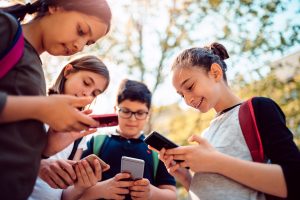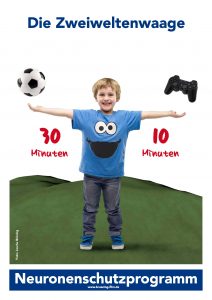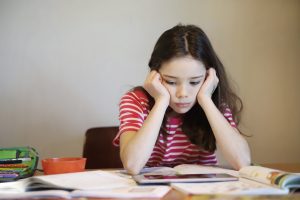Young people born after 1980 are often referred to as “digital natives” in academic literature, because they grew up with computers and the Internet just as naturally as other generations did with water, electricity and later the television.1)Spitzer, Manfred: Digital Demenz. Wie wir uns und unsere Kinder um den Verstand bringen; Droemer Verlag, München 2012, S. 204 “The term digital native is derived from the term native speaker and illustrates the fact that one has learned and mastered one’s native language differently and more intensively than, for example, a foreign language. One thinks and dreams in the mother tongue and has adopted the world view that comes with it without any criticism, one is part of this culture.”2)Jones, Christian: Students, the net generation and digital natives. In: Thomas M
(Hrsg): Deconstructing digital natives, 30-45, Routledge, New York This explains why young people seem to move so playfully and naturally in the digital world and seem to have their home in the modern world of information technology.
In 2011, scientist Chris Jones published an overview of the already enormous extent of the average online activities of a 21-year-old digital native (based on a 2008 survey): In his life to date, he has sent or received a total of around 250,000 e-mails or short messages (SMS), spent 10,000 hours on his cell phone, played 5,000 hours of video games and spent 3,500 hours on social networks.3)Cf. Spitzer, Manfred: Digital Demenz, S. 204
The well-known brain researcher and university lecturer Professor Manfred Spitzer from Ulm adds that during their daily routine, youth are online almost the entire day. They are for example, woken up by their cell phones; check e-mails and the weather in order to dress accordingly; stay permanently in touch with friends and family by texting, E-Mail or social networks; listen to music for several hours per day and let themselves then be purred to sleep by the iPod at 11 pm when the last WhatsApp is written. But the special thing is that this happens alongside other activities: television, lessons, homework, eating and even meeting friends. The perfect multi-taskers!?

A moderate use of screen media
What can be done to properly direct and channel this “lifestyle” now widespread among adolescents, and its associated effects, in the long run. This is by no means a question of condemning or demonizing media development that may well hold a lot of positive aspects for children and parents, if a few rules are followed. The aim is to help parents develop a strong inner attitude towards their children’s screen media consumption and to support and accompany their children in learning how to deal with these media in moderation.
German media educator Winfried Brüning and his wife, illustrator Astrid Brüning, have been working on the topic of “digital media” for many years and have intensively researched specialist literature and studies. On the basis of their research and their own observations, made in the course of their work with children and young people, and as parents of two media-loving boys, they have developed a “neuron protection program” for the new generation and their developing brains.4)https://www.bruening-film.de/filme/zwischen-zwei-welten.html, (last accessed on 9.11.2020)
 The aim of their work is to put all the findings and models of the influence of digital media on the developing brains of young people into an understandable language. Furthermore, they want to offer a comprehensible and practical concept that helps parents to stand up to the demands of education in the digital age. One such concept is the image of the 2-world scale.5)Film: Zwischen zwei Welten – Kinder im Medialen Zeitalter, BRÜNING FILM New edition 2020
The aim of their work is to put all the findings and models of the influence of digital media on the developing brains of young people into an understandable language. Furthermore, they want to offer a comprehensible and practical concept that helps parents to stand up to the demands of education in the digital age. One such concept is the image of the 2-world scale.5)Film: Zwischen zwei Welten – Kinder im Medialen Zeitalter, BRÜNING FILM New edition 2020
The two worlds of the digital natives
Young people grow up in two worlds. On the one hand, there is the real world in which they go to school, play soccer, handball or chess with their friends in a club, make music, ride horses, take care of their pet, dance ballet or hip-hop or just hang out together, exchange ideas and “chill out”. The other world in which they move with increasing time and with apparent ease, is the virtual world. It consists of video games, watching series, listening to music, googling content, shopping online, chatting with friends and following influencers on “relevant” online channels.
Media educator Brüning now recommends balancing these two worlds, which means that digital experience must be contrasted with real experience. The “rule of thumb” of the 2-world scale is
• If an elementary school child spends 10 minutes at the screen, he or she should balance this time with 30 minutes of real experience, for example by playing in nature, doing handcrafts, sports etc.
• For children in secondary schools up to the age of 18, it is recommended 10 minutes at the screen, is compensated with 20 minutes moving around outside or some other form of compensation in the real world.
 The “royal class of thinking” and the “time windows” of brain development
The “royal class of thinking” and the “time windows” of brain development
It is important to know about the characteristics of the human brain and the conditions under which our children’s brains can develop best. The “royal class of thinking” refers to networked thinking. In order for this to take place at all, the “time window” of early childhood in particular is of crucial importance.
A child’s “thinking machine” has yet to be set in motion, i.e. it must be ensured that many of its neurons are transformed into “knowledge makers”. In order for this to happen, it is essential that children have numerous experiences with all their senses, especially in their first 7 years of life. These experiences are stored in the nerve cells (neurons) and the information then passes from working memory straight into long-term memory.
Experiences with as many senses as possible (smell, taste, sight, hearing, touch/feel, sense of balance and movement…) are the basis for the fact that numerous memory tracks are laid in children and many information units are transferred from working memory (or short-term memory) to long-term memory, where they are stored and firmly anchored in the nerve cells (neurons). The more senses contribute their information e.g. to a cherry by collecting sensory impressions like red (sense of sight), sweet (sense of taste), smooth surface, soft interior, hard core (sense of touch), the more precisely the description of the cherry is anchored in the brain, because neurons are team players …
The numerous neuronal connections and networks that emerge from this form a stable foundation, which a person can then fall back on throughout his or her life and to which he can “dock” at any time with new experiences. This lays the foundation for networked thinking or the “royal class of thinking”.
However, neurons that are not used in this “time window” of childhood, that are, so to speak, “unemployed” due to missing or lacking experiences and the associated sensory impressions and experiences, die off again. A child whose large parts of the brain area has remained unused, and who consequently has not been able to build up a comprehensive foundation, will have difficulties throughout his life in catching up and making up for this.
Much to the regret of their parents, children even voluntarily prefer the “magical” screen media they love to adventures in nature, on the football field and meeting friends. The media are therefore in direct competition with the experience with all senses, which strongly impairs a healthy brain development of children. Because as soon as children sit in front of a screen, only the two senses of sight and hearing are used. The other 3 senses, namely the sense of touch, the sense of smell and the sense of taste, are left out.

For “screen media children”, who grow up at home with game consoles and smartphones in the sensitive phase of brain development or with tablets entertaining by them in nursery school, and who therefore often only have two senses addressed and activated, the foundation for storing sensory experiences and associated data in long-term memory is therefore significantly less than in children who can use their five senses as team players. If a predominantly real playing child has the possibility of successfully activating up to 60 billion neurons by the beginning of primary school, then screen media children can activate only 30 billion neurons. It is therefore not surprising that children who use screen-based media tend to have more simply structured brains and therefore reach their limits more quickly later at school and at work.
“Digital competence” is an illusion
“A child has to touch things, it has to learn to handle things. And when children come to school today and can no longer hold a pen because they have only been busy wiping over a glass surface and have not trained their hand properly in any way, either motorically or sensory, then they have one disadvantage, and a big disadvantage. We are raising a generation of disabled people, let me say it so drastically. The more finger games they do in kindergarten, the better they are at 20 in mathematics, because the numbers come into the brain via the fingers and their complex use. If they only wipe as nursery school children, their career end as cleaning specialists. You simply shouldn’t do that,” says German psychiatrist and neuroscientist Prof. Manfred Spitzer in a radio interview on the early use of digital media in nursery and primary schools.6)Deutschlandfunk: „Psychiater: Wenn Kinder nur wischen, haben sie einen Nachteil” from 08.03.2018; an interview by Tobias Armbrüster with Manfred Spitzer https://www.deutschlandfunk.de/digitales-klassenzimmer-psychiater-wenn-kinder-nur-wischen.694.de.html?dram:article_id=412480 (last accessed on 9.11.2020)
Asked about the argument of the “digital competence” to be acquired by the younger generation, which has been mentioned by numerous media advocates, Spitzer says: “You can’t talk to a three-year-old about sweets and say, hey, here’s a stack of sweets, now deal with it responsibly. That is nonsense. You can’t say nonsense to pubescent children who are just starting to think and empathise with all kinds of things: “Use your smartphone, but only in a very responsible way. 100,000 years ago, when two people fought or mated behind the bush, everyone looked. We know how we humans behave, and sex and crime are still the main content of the internet and of course you can use the internet on your smartphone. 14-year-olds are just like three-year-olds who like sweets, because 100,000 years ago, those who didn’t eat as much sweet fruit as possible while it was available, were dead by the next famine. That’s why three-year-olds are insensitive to sweet taste, and can eat the amount of sweets that would make adults feel sick.
As Professor Spitzer points out, children and young people cannot simply be allowed to make their own decisions because they are not yet up to the task in terms of age and maturity. This is also proven by the BLIKK study (2019) conducted by paediatricians, which shows that 13-year-olds feel overwhelmed by the smartphone and quickly lose control over it because it has proven addictive properties. Professor Spitzer: “In Korea, over 30 percent are addicts; we [in Germany] are at eight percent. We cannot say, “Deal with it!
Advice for the sensible use of digital media
The main aim of the “BLIKK Media” project (BLIKK: German: Bewältigen= engl. coping, German:Lernen=engl. learning;German: Intelligenz=engl. intelligence, German:Kompetenz=engl.competence, German: Kommunikation=engl. communication) is to limit the consumption of screen media for a limited period of time and to show children the joy of experiencing the real world and real interaction with friends with all their senses. Because, anchored in reality, children and youth will later be able to deal with media worlds in a more self-determined way.7)https://www.stiftung-kind-und-jugend.de/projekte/blikk-studie/ (zuletzt aufgerufen am 9.11.2020)
Parents should therefore ensure that their children have plenty of opportunities for real experiences. There are many possibilities: making a flower album of plants through the seasons, learning to cook for the family with the help of a children’s cookbook, making seasonal decorations with natural materials, enrolling in a pottery course, enjoying the seasons with all your senses – building a snowman and an igloo in winter, going swimming in the pool, river and lake in summer, fishing, sleeping in tents or in the open air (in a safe garden), taking a bicycle tour through a local forest or the surrounding area, hiking in the mountains, take an astronomy course and make your own sky observations in the evening, hear birdsong, learn to knit, crochet and sew, take a ski or swimming course, get craft kits and get creative, work with modelling clay…
A BLIKK brochure gives parents the following additional valuable advice for safely crossing the media jungle and using digital media sensibly:
BEING CAREFUL WITH MEDIA YOURSELF
✓ Make yourself aware. You are a role model for your child; he or she will imitate you.
✓ Use technical equipment yourself in a goal-oriented way and not out of boredom.
✓ Eat without screen media and use screen media without eating.
✓ Enable healthy sleep. Screen-free sleep rituals and screen-free bedrooms are necessary for this.
GIVING WAY TO REALITY BEFORE MEDIA
✓ Enable yourself and your children to have real experiences with other people and all their senses.
✓ Talk to your child and listen carefully.
✓ Allow your child to be creative by giving fewer directions.
✓ Avoid screen media for children under three years of age.
✓ In your free time, make sure that you spend more time moving than before a screen.
FIRST FILM EXPERIENCES (TV/ONLINE)
✓ Accompany your child’s film experiences: Interrupt at the beginning with questions, talk to children about what they have seen.
✓ Choose quiet, age-appropriate television programmes without violence. Do not leave the remote control to your children.
✓ Make use of the commercial break. Switch off the sound.
INTERNET AND EDUCATION
✓ Ensure that your child has sexual education before he or she gets it from the internet.
✓ Talk to your child about privacy, social media, violence, pornography, gambling. Start before you give your child his or her own Internet access.
✓ Also have your child show and explain what he or she is interested in on the internet.
USING SCREEN MEDIA IN AGE-APPROPRIATE LIMITS
✓ Establish clear rules and limit the usage of screen media time before switching on.
✓ Comply with age restrictions on computer games, films and social media.
✓ Discuss clear rules with your child on how to use the smartphone, for example by signing a mobile phone usage contract.
✓ Make sure that your child complies with the school’s mobile phone rules.
DO NOT USE SCREEN MEDIA AS EDUCATIONAL AIDS
✓ Do not use screen media for reward, punishment or reassurance!
WITHOUT AN ELECTRONIC UMBILICAL CORD
✓ Allow yourself and your child to be unreachable, too.
✓ Encourage your child to remain independent of the smartphone.
✓ Support communication without electronic devices.
✓ Plan a family Digital Detox time.
Treat yourself and your family to a Digital Detox day or evening, in other words, a short-term “detox” of everything digital (no smartphone, no tablet, no YouTube, no WhatsApp, no Instagram, no social media). According to a recent study by Bitkom Research8)https://unternehmer.de/studie/240179-digital-detox-studie, every tenth German citizen aged 16 and over (11 percent) has planned a digital detox for 2020. The year is not over yet …
Join in, shut down your PC and enjoy time with your loved ones, family and friends, “face to face” in the real world!
End part I – to be continued
References
| ↑1 | Spitzer, Manfred: Digital Demenz. Wie wir uns und unsere Kinder um den Verstand bringen; Droemer Verlag, München 2012, S. 204 |
|---|---|
| ↑2 | Jones, Christian: Students, the net generation and digital natives. In: Thomas M (Hrsg): Deconstructing digital natives, 30-45, Routledge, New York |
| ↑3 | Cf. Spitzer, Manfred: Digital Demenz, S. 204 |
| ↑4 | https://www.bruening-film.de/filme/zwischen-zwei-welten.html, (last accessed on 9.11.2020) |
| ↑5 | Film: Zwischen zwei Welten – Kinder im Medialen Zeitalter, BRÜNING FILM New edition 2020 |
| ↑6 | Deutschlandfunk: „Psychiater: Wenn Kinder nur wischen, haben sie einen Nachteil” from 08.03.2018; an interview by Tobias Armbrüster with Manfred Spitzer https://www.deutschlandfunk.de/digitales-klassenzimmer-psychiater-wenn-kinder-nur-wischen.694.de.html?dram:article_id=412480 (last accessed on 9.11.2020 |
| ↑7 | https://www.stiftung-kind-und-jugend.de/projekte/blikk-studie/ (zuletzt aufgerufen am 9.11.2020) |
| ↑8 | https://unternehmer.de/studie/240179-digital-detox-studie |








